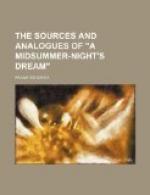I told him this was strange, if true, and that their country’s honour bound them more to believe in this than it did me.
“Truly, sir,” said my hostess, “I think we are called Long-tails, by reason our tales are long, that we used to pass the time withal, and make ourselves merry.” “Now, good hostess,” said I, “let me entreat from you one of those tales.” “You shall,” said she, “and that shall not be a common one neither, for it is a long tale, a merry tale, and a sweet tale; and thus it begins.”
THE HOSTESS’S TALE OF THE BIRTH OF ROBIN GOOD-FELLOW
Once upon a time, a great while ago, when men did eat more and drink less—then men were more honest, that knew no knavery, than some now are that confess the knowledge and deny the practice—about that time (whensoe’er it was) there was wont to walk many harmless spirits called fairies, dancing in brave order in fairy rings on green hills with sweet music (sometime invisible) in divers shapes: many mad pranks would they play, as pinching of sluts black and blue, and misplacing things in ill-ordered houses; but lovingly would they use wenches that cleanly were, giving them silver and other pretty toys, which they would leave for them, sometimes in their shoes, other times in their pockets, sometimes in bright basins and other clean vessels.
Amongst these fairies was there a he-fairy; whether he was their king or no I know not, but surely he had great government and command in that country, as you shall hear. This same he-fairy did love a proper young wench, for every night would he with other fairies come to the house, and there dance in her chamber; and oftentimes she was forced to dance with him, and at his departure would he leave her silver and jewels, to express his love unto her. At last this maid was with child, and being asked who was the father of it, she answered a man that nightly came to visit her, but early in the morning he would go his way, whither she knew not, he went so suddenly.




